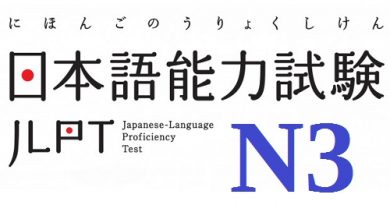Jlpt N3 vocabulary week 16
Jlpt N3 vocabulary week 16. To make it easier for you to study, Learn Japanese Online has collected Japanese N3 vocabularies from many sources. Each lesson contains 10 words (It’s a nice quantity for you to study regularly. The post is divided in to 6 days (or 1 week).
Contents
Tips for studying :
– Study regularly, do review in the next day, next 3 days and what you learnt in 1 week
– Note down difficult words that you spend all the week to study without result, then keep it with you to study anywhere
– You should imagine how the word is used in real life situation, make a sentence, or several other good ways in : How to learn Japanese.
– Determination and effort will help you to be successful !
Jlpt N3 vocabulary week 16
91. JLPT N3 Vocabulary – day 91
900. 髪を染める (かみをそめる) : to dye hair
901. 花が咲く (はながさく) : a flower blooms
902. 花が散る (はながおちる) : a flower falls
903. 木が枯れる (きがかれる) : a tree is dead (withered)
904. 山が崩れる (やまがくずれる) : a mountain crumbles down
905. 険しい山 (けわしいやま) : steep mountain
906. なだらかな坂 (なだらかなさか) : a gentle slope
907. 箱がつぶれる (はこがつぶれる) : a box is smashed
908. つぶす : to shut down, to smash, to crush
909. 浮く (うく) : to float
92. JLPT N3 Vocabulary – day 92
910. 沈む (しずむ) : to sink, to feel depressed
911. 蒸し暑い (むしあつい) : sticky, steamy, humid
912. くさる : to go bad, to decay, to spoil, to fester, to decompose, to turn sour
913. カビが生える (かびがはえる) : mold grows
914. 変なにおいがする (へんなにおいがする) : (to have) strange smell
915. におう : to smell. 百合の花がにおう : to smell lily flower
916. 気味が悪い(=気持ちが悪い)生き物 (きみがわるい(=きもちがわるい)いきもの) : creepy (feeling), uneasy (feeling), bad (feeling), scaring, weird(the same meaning with 気持ち悪い)
917. 親しい友人 (したしいゆうじん) : close friend
918. 親友 (しんゆう) : close friend, best friend
919. 怪しい男 (あやしいおとこ) : suspicious man
93. JLPT N3 Vocabulary – day 93
920. 恐ろしい事件 (おそろしいじけん) : an terrible incident, a scary case
921. さびた包丁 (さびたほうちょう) : rusty kitchen knife
922. さびる : to rust, to become rusty
923. 鋭い (するどい) : sharp
924. 鈍い (にぶい) : dull
925. のろい車 (のろいくるま) : a slow car. Besides, のろい has meaning: curse
926. 安全な場所 (あんぜんなばしょ) : a safe place
927. 薄暗い部屋 (うすぐらいへや) : a dim room
928. まぶしい明かり (まぶしいあかり) : dazzling, radiant light
929. 詳しい説明書 (くわしいせつめいしょ) : a detailed manual book
94. JLPT N3 Vocabulary – day 94
930. 詳しく説明する (くわしくせつめいする) : to explain in detail
931. くだらない小説 (くだらないしょうせつ) : a crap novel, a boring novel
932. でたらめに答える (でたらめにこたえる) : to answer randomly
933. 急(きゅう)に=突然(とつぜん)(突然電話が鳴(な)った) : suddenly : The phone rang suddenly.
いきなり(いきなり泣き出す。) / とたんに(とたんに泣き出す。): suddenly cry
934. 最後(さいご)= やっと(やっと怪我(けが)が治(なお)った。): last, end, conclusion, latest, most recent. Finally the injury was healed.
とうとう(うちの猫(ねこ)がとうとう死(し)んでしまった。): My cat finally died
結局(けっきょく)(努力(どりょく)したが、結局むだだった。): I made an effort, but in the end was not enough.
ついに(ついに絵(え)が完成(かんせい)した。): Finally, the picture was completed.
935. だいたい、いつも= よく(よくレストランに来ます)。always ( I always go to the restaurant)
昨日はよく寝ました : I slept well yesterday
「よくやった!」 Well done !
たいてい(たいてい外食(がいしょく)しました。)
mostly, usually (I usually ate out )
ふだんは(ふだんはお酒を飲みません。)
ordinary, usually (I usually don’t drink alcohol.)
ふつうは(梅雨(つゆ)の時期(じき)、ふつうは雨が多い。)
normally (During the rainy season, there is usually/ normally a lot of rain.)
たまに(たまに映画に行きます。) (たまにえいがにいきます :I rarely go to the cinema) : rarely, seldom
936. とても= かなり(かなり大きい家. 人がかなりいる。) : considerably, fairly, quite(Pretty big house. There are quite many people)
けっこう(今の家はけっこう気に入っている。) : rather, quite, pretty, jolly, fairly, reasonably (I pretty like my house now)
937. ものすごく(足がものすごく痛(いた)い。) : horribly, awfully, dreadfully(My feet are very painful)
めちゃくちゃ/むちゃくちゃ(めちゃくちゃ安い. 順番(じゅんばん)がむちゃくちゃだ) : unreasonable, excessive, inordinate, undue(insanely cheap. Messy)
事故で車がめちゃくちゃに壊(こわ)れた。) : The car was broken down terrifically in an accident.
強調 : Emphasis
ぜひ/ぜひとも(ぜひお越(こ)しください。) : by all means (Please come by all means.)
どうか(どうかお願いします。) : please (Please help me!)
938. 最初(さいしょ)に= まず(帰ったら、まずお風呂(ふろ)に入る。) : the first (When I get home, I first take a bath)
939. とにかく/ともかく(言い訳(いいわけ)などしないで、とにかく勉強しなさい。) : anyway (Don’t say anything, just study).
95. JLPT N3 Vocabulary – day 95
940. 一緒(いっしょ)に = 一度に(一度に花が咲(さ)く。) : together = all at once (Flowers bloom at once time.)
941. いっぺんに(たまった宿題をいっぺんに片付ける. いっぺんに疲れが出た : at the same time, at one time, at once, at a time, all at once, all together (Get rid of your accumulated homework at once.Fatigue comes at the same time.)
942. うっかり(する): 宿題をうっかり忘れる。
careless, thoughtless, absent-mindes. I forgot my homework.
943. すっかり: すっかり忘れた。 (すっかり:すっかりわすれた。) :
completely: I completely forgot
944. がっかり: 試験を落ちてがっかりした。 (がっかり : しけんをおちてがっかりした。)
Disappointed: I was disappointed because I dropped the exam
945. やっぱり/やはり : やっぱり思ったとおりだ。after all, as I though
18歳と言ってもやはりまだ子供だ。Even if I was said to be 18 years old, I am still a child.
946. しっかり(する): しっかりした子供
tightly : mature child
しっかりしろ! : Pull yourself together!(when panicked, fainted)
947. すっきり(する): 部屋がすっきりする. 気分がすっきりする
cleanly, without trouble: The room is clean. I feel refreshed.
948. さっぱり(する): 風呂に入ってさっぱりする. この問題はさっぱり分からない
feeling refreshed, feeling relieved : Take a bath and refresh. I completely don’t understand this problem.
ぐっすり : ぐっすり眠る (ぐっすり: ぐっすりねむる) : Sleep well
949. にっこり/にこにこ(する): にっこり笑う (にっこり/にこにこ(する): にっこりわらう) : to smile sweetly, cheerfully
96. JLPT N3 Vocabulary – day 96
950. そっくり : あの親子はそっくりだ。 (そっくり : あのおやこはそっくりだ。) : That mother and child are similar.
951. はっきり(する): 山がはっきり見える (はっきり(する): やまがはっきりみえる) : The mountain is clearly visible.
952. のんびり(する): のんびり過ごす のんびりする (のんびり(する): のんびりすごす のんびりする) : leisurely, at leisure, unhurriedly : Experiencing at leisure.
953. きちんと/ちゃんと(する): 洋服(ようふく)をきちんとたたむ. 態度(たいど)をちゃんとする
precisely, exactly, methodically, in good order, the right way: Tidy clothes in good oder. Have good attitude.
954. ふと : ふと思い出す ( ふと: ふとおもいだす) : suddenly remember
955. わざと:わざと負ける (わざと: わざとまける) :on purpose. Purposely (defeat)
956. ほっと(する):feel relieved. 母の病気が治ってほっとした。ははのびょうきがなおってほっとした : My mother has recovered so I’m relieved.
957. じっと(する): じっと我慢する じっと見る (じっと(する):じっとがまんする. じっとみる) : quietly, motionlessly: Be patient. Stare
958. ざっと :approximately, more or less, roughly. ざっと掃除する (ざっとそうじする) : Clean roughly
959. そっと(する) : そっと近づく (そっと(する) : そっとちかづく) : softly, quietly, gently. Softly approach
Above is Jlpt N3 vocabulary week 16. Learn the following weeks in the category : JLPT N3 Vocabulary.
Goodluck !

